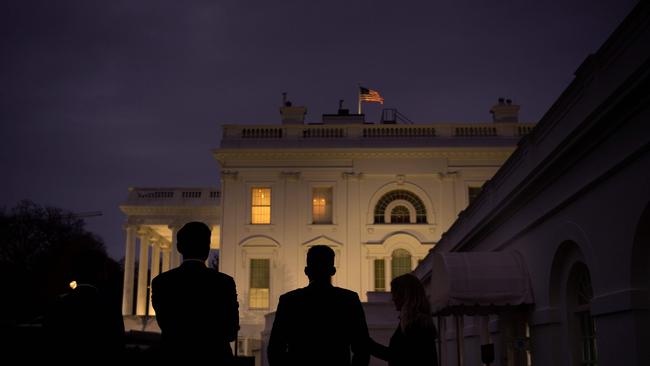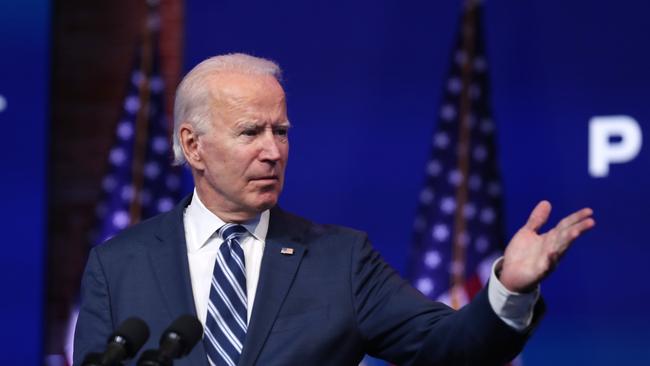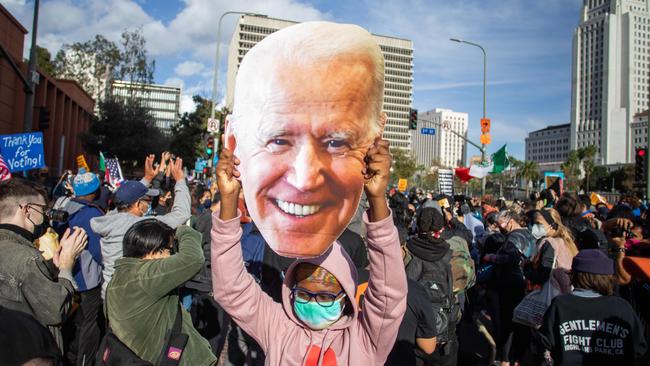Washington trapped in the twilight zone as Trump clings on
Like his namesake delusionist, Donald Trump is fighting just for the sake of the fight.

Americans are watching this protracted, split-screen drama with an air of disbelief and exhaustion after such a gruelling and bitterly fought election between Donald Trump and Joe Biden.
Yet there is almost no one in Washington, probably not even Trump himself, who seems to seriously believe that he can persuade the courts to overturn the election result because of fraud.
As a White House official told The Wall Street Journal, Trump understands the fight isn’t winnable but his mood is “Let me have the fight”. He has spoken privately of running again in 2024, which suggests he knows he has lost.
Most Republicans have chosen not to abandon their president in his Don Quixote-like quest, but they have largely straddled a safe middle ground by saying that all legal votes must be counted, rather than alleging large-scale fraud.
Biden himself has adopted a “nothing to see here” approach, trying to ignore Trump’s angry Twitter attacks while giving presidential-style addresses and calling world leaders, as a president-elect would normally do.
But the question on everyone’s lips is: what now?

The longer this impasse drags on, the more problematic it gets. Trump’s refusal to concede the election means the formal transition process for Biden’s team — including key briefings, access to classified information, access to agencies such as the Pentagon and State Department — cannot take place until it is signed off by the General Services Administration.
So far, GSA administrator Emily Murphy, a Trump appointee, has refused to sign the paperwork.
But Trump is showing no sign of backing down. He has emptied his official schedule, emerging publicly this week only to lay a Veterans Day wreath at Arlington National Cemetery. Inside the White House, the President has been firing off tweets about electoral fraud and holding meetings with his advisers and lawyers to oversee his legal assault on the election result.
“WE ARE MAKING BIG PROGRESS. RESULTS START TO COME IN NEXT WEEK. MAKE AMERICA GREAT AGAIN. WE WILL WIN,” Trump tweeted this week.
But Trump’s mood is said to be dark as he confronts the reality that Biden will become president in January. A wounded Trump has already lashed out this week, sacking Defence Secretary Mark Esper and purging senior Pentagon officials because he didn’t think they were sufficiently loyal.
As former Trump national security adviser John Bolton put it: “All transitions bring uncertainty, but to decapitate substantial parts of the national security apparatus during such a period for no reason other than personal pique is irresponsible and dangerous. Republicans know this.”
So far, Trump’s legal campaign to overturn the election result has been a failure. Despite a blizzard of lawsuits filed by Republicans across at least six states, no court has yet ruled that there has been any electoral fraud, much less on a scale needed to overturn a state result. For example, in Michigan alone five lawsuits have been filed alleging improper or fraudulent acts in the counting of votes. The courts immediately rejected three and two are pending. Yet Biden is leading Trump in that state by 150,000 votes, meaning that voting fraud would need to be uncovered on an industrial scale before that state’s result would come close to being reversed.

This is the fundamental problem facing Trump’s legal team. It is not good enough to uncover minor examples of voting irregularities — they need to find evidence of massive fraud across at least three states. Biden is on track to win 306 electoral college votes, the same as Trump won in 2016, a result he described then as “a massive landslide”. But in the other states Trump is contesting, Biden holds large leads — 50,000 votes in Pennsylvania, 37,000 in Nevada and 15,000 in Arizona. By comparison, the Supreme Court legal case that awarded the presidency to George W. Bush in 2000 involved just 537 votes in one state, Florida.
So far, most claims involved allegations that Republican election observers weren’t given sufficient access to monitor the counting of mail-in ballots for fraud. But legal experts say courts will not reverse election results based on this alone. “Courts will not disturb election results based on unproven generalised claims about the theoretical possibility of fraud,” says election legal expert Michael Morley, an assistant law professor at Florida State University.
In addition to legal claims, the Republicans are hoping that recounts in Wisconsin and Georgia — which are permitted because the results were close — will reverse the outcome in those states. But Biden leads by 20,000 votes in Wisconsin and 14,000 votes in Georgia.
“Since 2000, in 31 statewide recounts, the average change in votes was 430,” says Bob Bauer, lead attorney for the Biden campaign. “End of story. These margins simply cannot be overcome in recounts.”
The President’s insistence that there has been large-scale election fraud has put Republicans in an awkward position. They can see that his legal campaign to overturn the result is going nowhere, but they have mostly chosen to support Trump, meaning they will not admit publicly Biden has won.
Senate majority leader Mitch McConnell said: “Until the electoral college votes, anyone who is running for office can exhaust concerns in counting in any court of appropriate jurisdiction. I think we ought to quit all the hand-wringing and not act like this is extraordinary.” And Secretary of State Mike Pompeo said with a poker face that he was expecting “a smooth transition to a second Trump administration”.
The only Republican senators to have accepted a Biden victory are frequent Trump critics Mitt Romney, Susan Collins and Lisa Murkowski.
Republicans are supporting and indulging Trump in his unlikely legal quest because it is better to have a still powerful president on their side than against them. Trump’s closer-than-expected election loss makes him a likely kingmaker in Republican and conservative politics long after he leaves the White House. For Republicans, it makes little sense to create a long-term and powerful enemy by admitting, before Trump does, that Biden has won the election.
Republicans also need Trump to be in their camp in the coming months as they face two run-off elections for the Senate in Georgia in early January. Republicans need to win one of these two races to maintain control of the Senate and they are hoping that Trump will campaign for them.
Some congressional Republicans are also remaining loyal to Trump because he saved their jobs. Trump’s performance in the election means Republicans are likely to keep control of the Senate and have clawed back ground in the Democrat-controlled house. But Bolton, now a Trump critic, believes this “coddling” of the President sends the wrong message.
“The more Republican leaders kowtow, the more Trump believes he is still in control and the less likely he will do what normal presidents do: make a gracious concession speech, fully co-operate with the president-elect in a smooth transition process, and validate the election process itself by joining his successor at the January 20 inauguration,” Bolton wrote in The Washington Post.

A Reuters/Ipsos poll this week found that 80 per cent of Americans, including half of Republicans, believe that Biden is the rightful winner of the election. Even the conservative Fox News has taken a jaundiced view of Trump’s claims of Democrat involvement in vote-rigging, with Fox cutting away from claims made by White House press secretary Kayleigh McEnany during a press conference this week.
So far, Biden has sought to play down the significance of Trump’s refusal to accept his election win.
“We don’t see anything that’s slowing us down, quite frankly,” he said this week. “We’re going to do exactly what we’d be doing if he had conceded and said we’ve won, which we have. So there’s nothing really changing.”
When questioned about it, the 77-year-old said he thought it was “embarrassing” for the President and that it would harm his legacy, but Biden’s main strategy at this moment is not to attack Trump but ignore him. He has chosen to try to ride out the controversy by portraying himself, as he did during the campaign, as a uniter-in-chief. He says those Republicans siding with the President are “mildly intimidated” by him, but he is confident that they, and Republican voters, will recognise soon enough that he is the legitimate president-elect.
“I understand the sense of loss, I get that,” he said. “But I think the majority of people who voted for the President … I think they understand we have to come together. I think they’re ready to unite and I think we can pull this country out of this bitter politics that we’ve seen the past five, six, seven years.”
Other Democrats are less forgiving. “I don’t think many of us expected President Trump to leave the office of the presidency with grace,” Senate minority leader Chuck Schumer said. “But the extent to which the Republican Party is legitimising the President’s assault on our democracy is infuriating and deeply, deeply, wrong.”
Biden used his first week as president-elect to give presidential-style speeches, first on the coronavirus, which is out of control across much of the country, and also on the importance of Obamacare, as the Supreme Court considers its future.
He also spoke to a raft of world leaders, including Scott Morrison, showing that much of the global community, including some close Trump allies such as Turkish President Recep Tayyip Erdogan, have accepted Biden’s victory, even if Trump has not. But China’s Xi Jinping, Russia’s Vladimir Putin and Brazilian President Jair Bolsonaro have not yet publicly acknowledged a Biden victory.
Biden has had to make these phone calls without the usual assistance of the State Department because of Pompeo’s refusal to recognise Biden’s win.
Biden is also moving ahead with his consideration for cabinet jobs and key White House appointments. His choice of longtime Washington operative Ron Klain as his White House chief of staff suggests that Biden wants a more traditional West Wing than we saw in the turbulent ever-changing Trump administration.
Klain, 59, has been a senior adviser to Democratic presidents and vice-presidents, and he ran Biden’s office when he first became vice-president.
“His deep, varied experience and capacity to work with people all across the political spectrum is precisely what I need in a White House chief of staff as we confront this moment of crisis and bring our country together again,” Biden said about Klain.
Biden has said he will make at least two cabinet choices before Thanksgiving at the end of the month. This process has been complicated by the likelihood that Republicans will control the Senate, making cabinet confirmations harder. Biden may also be more wary of appointing high-profile left-wing candidates such as Bernie Sanders or Elizabeth Warren to key roles if he wants to develop a working relationship with a Republican-controlled Senate.
But the left wing of the Democrats, having kept their silence during the campaign, is now pushing to have a louder voice.
“We are always messaging around bipartisanship and how much we love working with Republicans all the time in a lot of these sensitive areas,” says prominent left-wing congresswoman Alexandria Ocasio-Cortez. “We need to have an unapologetic agenda, have an actual alternative and counter-messaging that is distinct from the Republican Party instead of trying to play to notions of civility.”
Biden is expected to give senior posts to former presidential aspirants Pete Buttigieg, Amy Klobuchar and Julian Castro. Deposed Democrat senator Doug Jones, Los Angeles mayor Eric Garrett and Atlanta mayor Keisha Lance Bottoms are also said to be high on Biden’s list of potential appointees.
From Australia’s perspective, the two most important cabinet positions will be secretary of state and secretary of defence. The three leading contenders for secretary of state are said to be Biden’s close friend Chris Coons, a member of the Senate Foreign Relations Committee; William Burns, a retired diplomat; and Susan Rice, former national security adviser to Barack Obama. Of these, Rice is the most experienced but she may struggle to win confirmation from Republicans in the Senate because of lingering controversy over her handling of the crisis in Benghazi, Libya, in 2012 when a US ambassador was killed.
The hot favourite for the defence job is former undersecretary Michele Flournoy, while another strong contender is army veteran and senator Tammy Duckworth.
While Biden is considering the make-up of his team, the gridlock over the contested election result shows no immediate sign of ending. Barring an unexpected concession from Trump, his legal team has about two weeks left to prevent the election results from being certified.
Georgia is scheduled to certify its results on November 20, with Michigan and Pennsylvania due to report three days later. Arizona will certify on November 30 and Wisconsin on December 1.
So unless Trump’s legal team can persuade a court they have enough evidence of fraud to warrant delaying the certification process — which appears highly unlikely — then Biden’s win will be formalised in early December.
That doesn’t mean that Trump will accept the result. He may never do so. But it will mean that Biden has the proof of victory to ensure that he is the man who raises his right hand on January 20.
Cameron Stewart is also US contributor for Sky News Australia.







It is almost two weeks since the US election, yet Washington is trapped in a twilight zone where the two men who contested it still claim that they will be the nation’s next president.